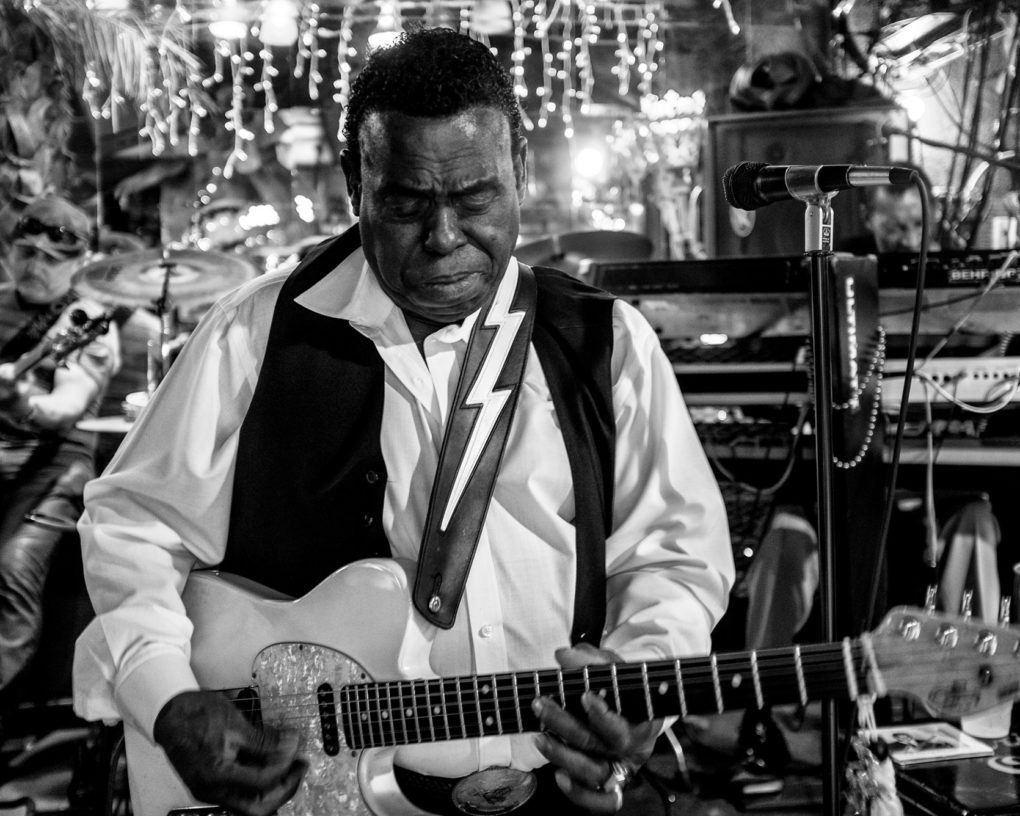Ernie Vincent Gets Stars' Assist on "Original Dap King"

Ernie Vincent by Tim Duffy
The title tells us who New Orleans R&B guitarist is. Does the album tell us as much?
First take: Ernie Vincent’s Original Dap King is a lot of fun. It ranges from New Orleans funk through three or four blues styles and a handful of psychedelic R&B tracks, all solidly performed with varying levels of verve. The Drive-By Truckers’ Matt Patton’s production sounds retro enough for cratedigger fetishists, but not so retro that the sound is the story. He also contributes to four songs and The Squirrel Nut Zippers’ Jimbo Mathus contributes three, all of which work just fine.
Second take: Original Dap King is clearly a labor of love, but the songwriting division means that Original Dap King works as a collection of songs, but it doesn’t add up to a coherent album. It opens with the exuberant “Body Shop,” but the album never returns to that “Fiyo on the Bayou” groove again. It visits a number of soul, blues and R&B styles over the course of 10 tracks, and while that variety keeps the album lively, it keeps it from positioning any clear identity—much less Vincent’s—at its core.
In some ways, that’s true to Vincent’s career. As he says in the album’s press notes, “I’ve always been the kind of guy who likes to work in the background supporting others rather than drawing attention to myself.” Listen to “Dap Walk” from 1970 and songs he recorded around that time and you can hear that thought in action. Vincent’s a funky guitarist who can do a lot of things, but it’s hard to hear his musical signature. That’s the case on Original Dap King too.
Is that a problem? If we were talking about the pop marketplace where part of what we’re buying are images and the illusion of connection to the artist as much as the music, yes. But on an album aimed at people who like their R&B sounding slightly derivative on scratchy 45s, that facelessness might be a plus. That market fetishizes the overlooked connections to the heyday of soul and R&B, and Vincent’s absolutely in that number. It helps that he stays in his wide musical lane and doesn’t try to update his sound. It’s never pretty when R&B hitmakers from the ‘60s and ‘70s try to play what’s popular now but pull up somewhere around the time The Pointer Sisters recorded “Jump.” They’re neither comfortable nor current. I’m seen Vincent sets when he flirted with that, but on Original Dap King, he doesn’t stray too far from his comfort zone.
The album’s most radical move is a cover of “Black” by the metal band Neurosis. The oppressive synths mimicking strings hint at the song’s origins, but Patton doesn’t try to walk Vincent into another musical world and instead retrofits the song so that it makes sense here.
Third take: Original Dap King brings to mind Dr. John’s Dan Auerbach-produced Locked Down and Bobby Womack’s The Bravest Man in the Universe , produced by Damon Albarn and XL Records’ Richard Russell. Musicians who are fans produced albums that captured what they loved about the artists with the aim of introducing them to a new audience. Those albums and countless other similar projects usually work as standalone projects and are frequently really interesting, but the musicians rarely seem very committed to them. When Dr. John finished the Locked Down tour, he rarely revisited those songs again, even though they mimicked his Night Tripper catalogue. When Bobby Womack played Jazz Fest two years after releasing The Bravest Man in the Universe, he dismissed the idea of playing anything from it.
There’s nothing on Original Dap King that Vincent will like reject, likely because Patton and Mathus don’t appear to have overstepped themselves. The weakness in many of those albums is that the producers try to do something at odds with the artist’s project. It’s understandable that Auerbach preferred the psychedelic Night Tripper material to the albums when Dr. John translated New Orleans for the world, but since Dr. John spent far more of his career in that mode than his trippier one, he obviously saw artistic merit there and returned to it as soon as he could. Albarn and Russell’s cool, textured electronic beats might introduce Womack to another generations, but the generations that have been supporting him for years are looking for horns, guitars, funky drums and keyboards. Albarn and Russell clearly loved the dramatic sound of Womack’s voice as it ages, but for a guy who has been about hits, the vocal textures the album highlights are ones he has left on the studio floor for years.
You don’t hear Patton falling into that trap, perhaps because Ernie Vincent didn’t have such a clear artistic personality that there was something there for him to fixate on. As a journeyman guitarist, Patton could have remade in almost any image but instead he simply helps Vincent record some songs that suit him. Original Dap King’s not more than that, but it’s not less than that either.
Creator of My Spilt Milk and its spin-off Christmas music website and podcast, TwelveSongsOfChristmas.com.






